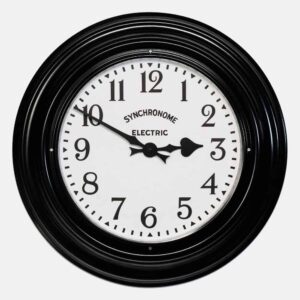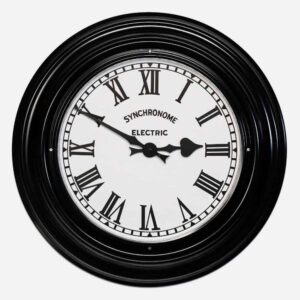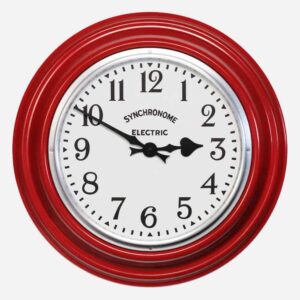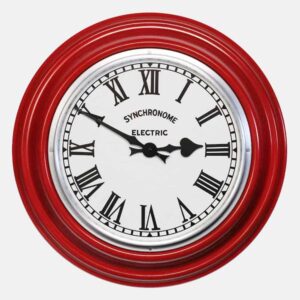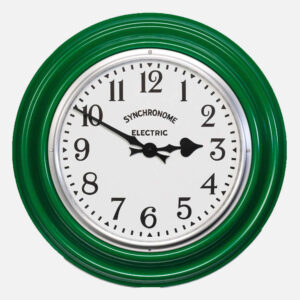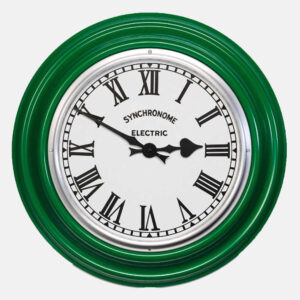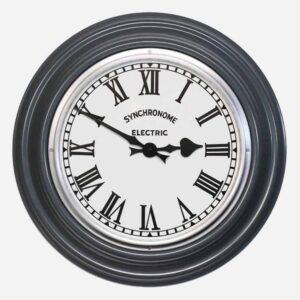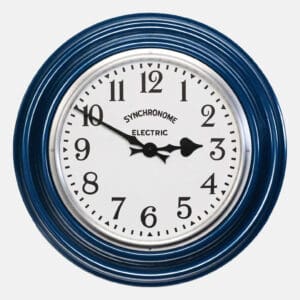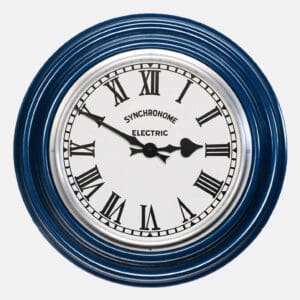
Vintage Metal Wall Clocks Handmade in Britain
Synchronome was established in 1895 by Frank Hope-Jones. And Synchronome started making electric clock systems for British industry in the late 19th century. Frank’s older brother Robert Hope-Jones was a pioneer in the field of electric organs with Wurlitzer, and aided early experiments adapting clock movements with electricity. The name Synchronome comes from ancient Greek: syn (with), chronos (time) and nomos (law) – in accordance with the law of time.
From 1898 Synchronome was based in London’s Clerkenwell, then Alperton in the 1930s, and Wiltshire in the 1960s. Today their clocks are made on the English-Welsh border, at Hay-on-Wye. Mark Hope-Jones who is the great-great-great-nephew has relaunched the Synchronome brand, using local companies to recreate the traditional wall clocks. This is a one man love affair with a family brand that had disappeared. Mark has spent years working out how to make the clocks as good as the originals. Handpicking local craftsmen and women to faithfully recreate these heritage and beautiful wall clocks. Clocks that have been a part of British life for over a century.
The case is hand spun from a single sheet of steel. The metal dial is manually hand printed with either Roman or Arabic numerals. Each metal clock is hand stamped as they used to be with date of manufacture and serial number. Whilst the metal clock hand have been counter weighted for accuracy. All parts except from the quartz timer is traditionally made by craftsmen and women.
Synchronome built clocks for factories, railways, observatories, newspaper offices, hotels and hospitals across Britain. Clients included the BBC, Selfridges, Harrods, Liberty, Rowntree’s, Cunard, Vickers, Army & Navy Stores, the London Underground and The Times. Thier clocks can still be seen on the outside of Liberty’s and Selfridges. The company also offered marine installations, outfitting ocean liners such as RMS Franconia of the Cunard Line with electric clocks that told the same time on every deck, and exported its timekeeping systems all over the world. Their clocks also still occupy rooms 38-39 of the British Museum in London. There you will find an original Synchronome master clock connected to a pair of dials. You can purchase quartz-driven recreations of these black British Museum clocks on Sir Gordon Bennett.
As a few side notes. Frank Hope-Jones authored several books and delivered numerous lectures and radio broadcasts on the subject of timekeeping. He personally announced the first introduction of British Summer Time on BBC radio in 1923, counting down the last five seconds of the hour. Subsequently, he suggested that the BBC collaborate with the Royal Observatory, Greenwich to regularly transmit accurate time signals, which led to the famous six ‘pips.’ Frank Hope-Jones crossed paths with Albert Einstein during a 1935 tour of the United States. While in Philadelphia, Hope-Jones was presented with an award by The Franklin Institute and gave a talk that was attended by Einstein. The two men, who shared a fascination with time, met on board the Queen of Bermuda a few weeks later and the friendly encounter was captured on film by a fellow passenger.
Shop Synchronome Clocks
Synchronome Clocks
Buy Synchronome Clocks from Sir Gordon Bennett. We are the purveyor of British made goods and gifts with free delivery on orders over £20
Showing all 9 results

